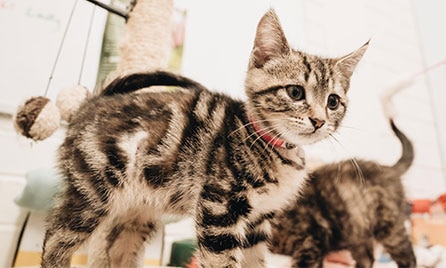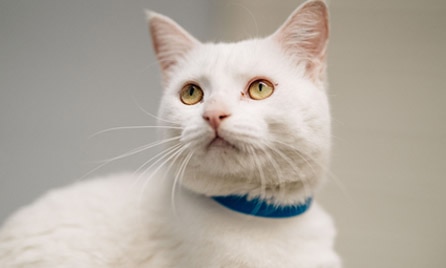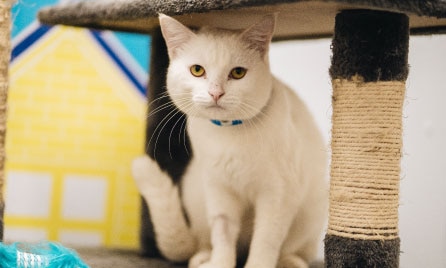- text
-
Everyday Pet Insurance policies entered into for the first time prior to 17 July 2023 and subsequent renewals of those policies are issued by The Hollard Insurance Company Pty Ltd ABN 78 090 584 473, AFSL 241436 (Hollard), arranged and administered by PetSure (Australia) Pty Ltd ABN 95 075 949 923, AFSL 420183 (PetSure) and promoted and distributed by Hollard’s Authorised Representative (AR) Woolworths Group Limited ABN 88 000 014 675, AR 245476 (Woolworths).
Everyday Pet Insurance policies entered into for the first time on or after 17 July 2023 and subsequent renewals of those policies are issued by PetSure and promoted and distributed by PetSure’s AR, Woolworths.Dr Harry Cooper (AR No.1000933) is an AR of PetSure and promotes Everyday Pet Insurance policies.
Any advice provided is general only and does not take into account your individual objectives, financial situation or needs. Please consider the Product Disclosure Statement (PDS) to ensure this product meets your needs before purchasing, or choosing to continue with the product. PDS and Target Market Determination available at insurance.everyday.com.au/pet-insurance.
Dr Harry: Kittens and Cats 101.
If I’ve talked you into or at least made you think about getting a furry feline, you might be wondering - where should I get one? Do I get an adult or a kitten? And how will it get on with our dog? It’s worth thinking about. Here are some tips on how to accommodate a new feline in your life.
Where to find a pet kitten or cat.
Most people like to buy a kitten simply because they’re ‘cute,’ and that factor wins every time. A lot of my clients have opted for a Moggy, and there are plenty of places to get hold of one of these little rascals. Welfare organisations like and are usually overflowing with likely candidates. Their colours are varied, and they cost a lot less than a purebred individual.
There are also plenty of cats that are still not desexed roaming around, and they are non-stop breeders. You will often find kittens advertised on social media or simply word of mouth. Pet shops will offer a large range too, with some being thoroughbreds. Veterinary Hospitals often offer kittens too. The age will usually be a little over eight weeks and usually desexed, wormed, and vaccinated.
What to look out for when you pick a kitten or cat.
How do you go about choosing a kitten to suit your needs? Well, I use feathers. There are two things cats and kittens really love, and that’s feathers and those little furry toy mice you can buy almost anywhere. Take a couple of feathers, about 10 to 15 cm long, tape them together at the quill and tie on a bit of hat elastic. You then simply dangle the toy in front of the litter and look for reactions. The amount of energy they put into playing is a pretty good indication of the energy levels they will have as they grow. Boys tend to be more active than the girls, so pick what suits you and the family.
You must have a good look over the kitten you have chosen. There are two diseases you need to look out for - the first is ringworm. It’s not a worm at all - it’s a fungus and shows up on the kitten as bald or hairless patches, usually around the face and the front feet. It’s contagious to you and me and the kids, and produces circular itchy areas on exposed skin. It’s treatable, but a pain in the neck, as it takes time to clear it up totally. Next, have a really good look at the nose and the eyes - is there any redness or discharge, is there a sneeze?
Vaccinations are available, but there are occasions when protection may not be effective. Talk to your vet about the sort of vaccine you should use on your kitten.
Many from shelters and pet shops will already be vaccinated, but they won’t be fully protected till they have completed the vaccination course.
Mature cats are readily available at all the above outlets. You will have an idea of the cat’s temperament right from the start once you handle these furry felines. Adopting a mature cat is a really kind thing to do and you are giving that animal a second chance at life. Their carers will be able to guide you as to which particular individual will fit in with your household.
If, like me, you crave a Burmese or perhaps a Rag Doll, then ninety percent of the time you will be buying from a breeder. Try to check out the parents if you can. The temperament of both, but particularly the mother, will very much influence the behaviour of the litter. You can often choose your ‘pick’ at a young age and collect it later when the kitten is around ten weeks of age. You’ll get all the paperwork, including pedigree, and information on diet, worming, vaccination, grooming etc. Some may already be neutered.
Things you need when you buy a kitten or cat.

Bring a pet carrier when you call to collect that kitten, wherever that may be. Don’t trust cardboard boxes or ‘wrapped in a blanket’, play it safe, after all you will certainly need the carrier again for visits to the vet and perhaps boarding facilities. Kittens come with one big plus over puppies: they are already toilet trained.
Make sure you check what sort of litter the breeder or the pet shop is using and stick with the same at least to start with. The same applies to diet; keep feeding the original foods that the kitten is used to, and then if you wish to change, do it gradually.
You will need a litter tray, plus food and water containers. Go for glass or ceramics, definitely not plastic, cats don’t like the smell. Keep one for dry, and another for wet food. I prefer a covered litter tray, placed in an area which is a little ‘private’ so your feline can do its business in peace. Eating and drinking receptacles should be kept well away. Cats are like us. Would we eat our dinner in the toilet? Sleeping quarters should be a cocoon, or better still an igloo, again in a quiet warm area. Cats love to be warm.
Feeding your kitten or cat.
After almost 20 years of breeding cats, I am convinced that if you introduce a new food to a young kitten at weaning, they will always eat that food later on in life. Hence my plea for bones. Kittens from our cattery were used to eating raw chicken wings from the age of six weeks. As they grew, they continued to eat them at least twice weekly. There were very few dental problems in any of these cats. Yet today, dental problems are one of the major health problems of cats! Please try to introduce some raw chicken wings in an attempt to potentially prevent dental problems in your cat.
Toys for your kitten or cat.
A scratching post is essential if you hope to preserve your furniture or drapes. There are many and varied items on the market, usually covered in carpet. I like those with a box at the bottom to play hide and seek in, and a reasonably tall one, up to 1.8 metres, as cats like to be up high and look down on the world. It’s also valuable if you have a dog. It’s an escape area from the dog. Hang some toys, or feathers, from the various shelves to encourage the kitten to use it. They are adept climbers.

Training your kitten or cat.
Training is not as easy as with your puppy. Walking on a lead needs a harness, and a lot of perseverance. Cats don’t walk like dogs, they are inclined to meander all over the place. Put the harness on initially for short periods, and when the kitten seems confident, attach a lead and allow it to be dragged around, before you finally pick it up and exert gentle restraint.
If your kitten has a ton of ‘spirit’ then you can make it work. The earlier you start, the better. Some training has to be stern. I find a good water pistol the best control measure for a wayward kitten or cat. Adding a small percentage of vinegar or lemon juice to the water makes it all the more effective. Some cats will respond to their names, but most respond to the smell of food. Yes, with cats it’s all about ‘What’s in the cupboard’. You can teach them tricks too, like high five, and roll over. Little dried fish or peeled, cooked prawns are often good rewards.
Grooming your cat or kitten.
Rarely would I bath a cat. They frankly don’t like it and you risk getting badly clawed. Cat scratches and bites often become infected, so take care. They groom themselves using their tongues which have a built in set of combing spikes on the upper surface. If your cats shed a lot of hair then this can often be swallowed and become a ‘hairball’ in the stomach, which your cat will eventually vomit. Here we go again! Use of an intermittent laxative every couple of weeks will stop the hair build up, just be careful when dosing. Cats are quite fastidious about their well being and spend a lot of time grooming, and a lot of time sleeping.
Curbing behavioural problems in your kitten or cat.
Possibly the biggest behavioural problem with cats is spraying, so a word about that. It is indiscriminate urination to put it scientifically. While most of the time it is a male problem, and by male I mean neutered males, because none of us could possibly keep an entire male in the house, the stench would drive us bonkers. The offender will back up to a wall, the curtains or furniture, raise their tail in the air, tremble it, while at the same time spraying urine onto the area. It is a basic scent marking behaviour that all cat breeds can display, even the big guys like cheetahs and leopards. Most vets believe it is related to stress, and often this is due to a menacing cat from next door. Treatment in my hands has never been a hundred percent effective. You will need to talk to your vet about various therapies, but ‘Feliway’ plugged into a power point in the offending area may help. It’s a natural stress reducing product.
Creating the right environment for your kitten or cat.
A final word about my other feline hobby horse (the first was bones, remember), the environment. Cats are masters of the art of hunting, and they are so well equipped to do it! There has always been the thought that if we kept our cat in at night, we would be doing our bit for nature. I am sorry to disappoint you. It’s just not on. You need to build your cat an outside enclosure, or buy one. I term it a reverse aviary. The birds are on the outside and the cat is on the inside. Have a look on the internet at some of the wonderful structures people have built to give their cats the freedom of the outside world, but protection as well. “Feline Aids'' as it’s commonly called is spread by bites from an infected cat, usually the local “Tom’ who will certainly want to prey on your cat given half the chance. Ask your vet about this problem.
I have had some lovely cats over the years, but none as gorgeous as “Mr. Magic”. He was special. He was different. He was a Red Burmese, but I could not stop him from spraying, so I built a run for him near the house. When I knew my time in Tasmania was coming to an end, I brought him back inside the house for company. He was a good age. His kidneys were failing, but he never once sprayed the whole time. He died in his sleep, at peace, on my bed. Yes, he was magic and although his show wins would number in the hundreds, it was his ‘roll over, scratch my tummy’ the moment you laid hands on him, that endeared him to unveil “Mr. Magic.”





